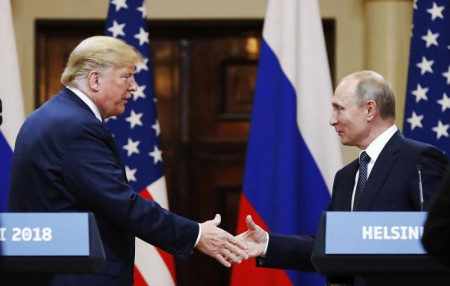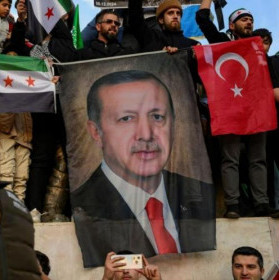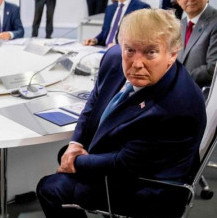
The leaders of Russia and the United States spoke over the phone on Wednesday, and Armenia’s parliament takes a step toward joining the EU. Meanwhile, Washington scales back support for Ukraine. These stories topped Thursday's newspaper headlines in Russia, according to TASS News Agency.
Izvestia: Putin, Trump discuss Ukraine, Middle East, Iran nuclear deal in phone talks
On February 12, Russian President Vladimir Putin and US leader Donald Trump spoke over the phone for almost 90 minutes. Among other topics, the two leaders discussed a prisoner swap: Moscow and Washington agreed to release American citizen Mark Fogel and free Russian national Alexander Vinnik from American jail. Also, the two politicians raised the issue of the Ukraine crisis, with Trump favoring putting an end to the hostilities there as soon as possible. Putin expressed his readiness to welcome US officials in Russia on topics of mutual interest, including the resolution in Ukraine. Besides, Putin and Trump agreed to hold an in-person meeting.
In an interview with Izvestia, Konstantin Blokhin, a leading researcher at the Center for Security Studies, drew comparisons between the latest Russian-US prisoner swap and the previous large-scale exchange in August. "Back then, there was a practical purpose, but now things are perceived as a sign of goodwill with the aim of creating a positive environment toward a fruitful dialogue between the two countries," he said. While it is clear that negotiations will be complicated and take time, the dialogue already underway is being conducted in a different atmosphere, he maintained.
Andrey Kortunov, research director of the Russian International Affairs Council, expects that Russia and the United States will likely issue instructions to corresponding agencies, diplomats, and the two countries’ militaries to work toward a meeting between the two leaders. "Much will depend on lower-level efforts," he told Izvestia.
It’s noteworthy that the US leader continued telephone diplomacy by calling Ukraine’s Vladimir Zelensky. The conversation went "very well," Trump said. "He, like President Putin, wants to make PEACE," Trump wrote on his Truth Social media.
It is significant that the call from Washington was made to Moscow first and then to Kiev, signaling to Ukraine that it may receive the same priority in the future, noted Tigran Meloyan, an analyst at the HSE Center for Mediterranean Studies. "The phone conversation marks the end of the so-called ‘international’ isolation of Russia. Without direct engagement with Moscow, it has become clear that certain international issues, particularly in terms of security, cannot be resolved," the expert concluded.
While the Putin-Trump discussion has been viewed positively, it is premature to assume it will improve relations between Russia and the West: dissatisfaction with the recent talks was apparent in Europe, and some US politicians also referred to them as a surrender to Moscow. Nevertheless, the conversation "charted a long and difficult course that will involve numerous future contacts, but what is crucial is that both sides are prepared to pursue it through dialogue," Meloyan added.
Vedomosti: Armenia embarks on path toward accession to EU
On Wednesday, the National Assembly of Armenia, the republic’s unicameral legislature, adopted the first reading of a government-endorsed bill on initiating Armenia’s entry process into the European Union. A total of 63 pro-government MPs voted for it, with six members of the I Have Honor faction, founded by former President Serzh Sargsyan, voting against. The opposition Armenia Alliance led by another ex-president, Robert Kocharyan, abstained from the vote.
A bit later, Kremlin Spokesman Dmitry Peskov described Armenian lawmakers’ decision as the country’s "sovereign right," as he noted how challenging the process of admitting countries to the European bloc is.
Stanislav Pritchin of the Russian Academy of Sciences’ Primakov Institute of World Economy and International Relations (IMEMO RAS) told Vedomosti that Armenia has no right to join the EU as a full-fledged member. "Unlike its neighbor [Georgia], Armenia does not share a sea border with Europe, and its national legislation has not yet conformed to European norms. Nevertheless, Yerevan can anticipate being granted EU candidate status, but nothing more," he explained.
The EU does seek to start integrating Armenia but only for the sake of this process itself, Nikolay Silayev, a leading researcher with the Center for International Studies at Moscow State Institute of International Relations, observed. Brussels needs to demonstrate a Russian defeat in the Caucasus, and Yerevan facilitates this, the expert argued. "Before granting EU candidate status, the Europeans will likely demand that Armenia join the anti-Russian sanctions, which will inflict a major blow to the country’s export potential and economy," Silayev believes.
However, Yerevan realizes the benefits of its membership in the Eurasian Economic Union and will therefore strive to retain all economic advantages and access to markets, Pritchin said.
Armenia has been essentially winding down its cooperation with the EAEU, Silayev continued, as the Armenian parliament opted for European integration even after Moscow warned that it cannot be a member of two organizations simultaneously. "How soon will Armenia withdraw from the EAEU and the legal formalization of a loss of benefits and other aspects associated with this step will now be on the agenda," he concluded.
Izvestia: Trump administration distances itself from supporting Ukraine
On February 12, Brussels hosted the 26th meeting of the Ramstein Group, its first in the Trump era. The Pentagon’s new chief, Pete Hegseth, attended the event on his first international trip as US Secretary of Defense. According to him, the United States doubts Kiev will join NATO as he called Ukraine’s potential membership in the alliance an "unattainable goal."
Moreover, Hegseth said, the US will prioritize countering China in the Asia-Pacific under Trump, citing Beijing as a threat to Washington’s "strategic interests" there. This shows once again that the US is slowly shifting its foreign policy focus from Ukraine and that Kiev should seemingly expect greater military support from its European allies instead.
However, it is too early to say that Washington has withdrawn support for Kiev, for the Ukraine issue will be discussed again at a NATO defense ministers’ meeting later on Thursday and at the Munich Security Conference on February 14-16. Additionally, Ukraine’s Zelensky is scheduled to meet with US Vice President JD Vance on Friday.
Meanwhile, Trump’s National Security Adviser Mike Waltz has declared that European countries should assume responsibility for Ukraine moving forward. In this light, Washington insists that they increase their defense spending to at least 5% of GDP.
"Spending 5% of GDP on their defense budget would be impossible for the majority of European countries. Some could perhaps raise their expenditure, but not to that extent. The [United] States has traditionally spent more than Europe, which is why it has played a leading role in Ukraine, but Trump no longer wants this role. He is currently trying to deliver on his election pledge to stop the conflict, even as freezing it seems like a more likely scenario," German political analyst Christoph Herstel argued.
Nezavisimaya Gazeta: Kiev introduces contracts for recruits aged 18-24
The Ukrainian Defense Ministry has launched contracts for young male and female volunteers aged 18 to 24. Among other benefits, the program offers a 1-year military contract with a payment of up to 1 million hryvnias ($24,000). The announcement has already angered older soldiers, and concerns have been voiced that Kiev may later expand its mobilization drive to reduce the call-up age below 25.
Alexey Getman, a Ukrainian National Guard major (retired), warned reporters that the privilege granted to one category of servicemen will inevitably provoke resentment among other age groups. He also surmised that Kiev would call up 18-year-olds later, when the financial incentive no longer works.
To military expert Vladimir Yevseyev from the Institute of CIS Countries, the financial incentive announced by the Kiev regime looks quite unrealistic, at least because there are no plans to give 1 million hryvnias as a one-off payment, unlike in Russia, which pays an enlistment bonus upon the signing of a contract.
Moreover, many in Ukraine understand that the touted bounty risks becoming a trap. Nor is it likely to attract many new recruits, especially since servicemen have been getting increasingly demoralized.
"The Ukrainian army clearly lacks manpower, but Vladimir Zelensky has been reluctant to lower the mobilization age. He fears that the United States could pressure Kiev into holding a new election next fall, as he will lose the vote. Therefore, the Ukrainian leader will make every effort to avoid a step that is too dangerous for him. And Ukraine will likely try to replenish its troops through manipulative recruitment methods, including by offering contract stints," the expert emphasized.
Rossiyskaya Gazeta: MOEX index rises above 3,000
On Tuesday, the Russian stock market closed above 3,000 for the first time since July 2024. The MOEX Russia Index traded at around 3,050 on Wednesday afternoon, the platform’s data showed. The index has hovered near the psychological 3,000-point mark almost throughout this winter.
"The MOEX Index surpassed the 3,000 level mostly due to a slowdown in inflation that creates conditions for monetary easing, and ahead of potential negotiations between Russia and the United States to resolve the Ukraine conflict. These two factors boost investor sentiment," Kirill Klimentyev at Tsifra Broker told Rossiyskaya Gazeta.
In geopolitical terms, the Russian market awaits news on resolving the Ukraine conflict, something US President Donald Trump has heavily discussed in the past month, but investors need more than that. The Munich Security Conference slated for February 14 could also heat up investor optimism.
"While the latest growth was due to positive factors, whether that will be sustainable depends on how the geopolitical and macroeconomic situation evolves. There could be a correction should the negotiations lack any progress or the economy worsen," Klimentyev warned as he said the market could target the 3,200-point mark next.
Mikhail Zeltser, a stock market expert at BCS World of Investments, argues that 3,500 points, or a 15% rise, is the fundamental target for the MOEX Index. To him, the goal does not look unattainable, given that the index has risen by almost 30% in the past two months.
TASS is not responsible for the material quoted in these press reviews









